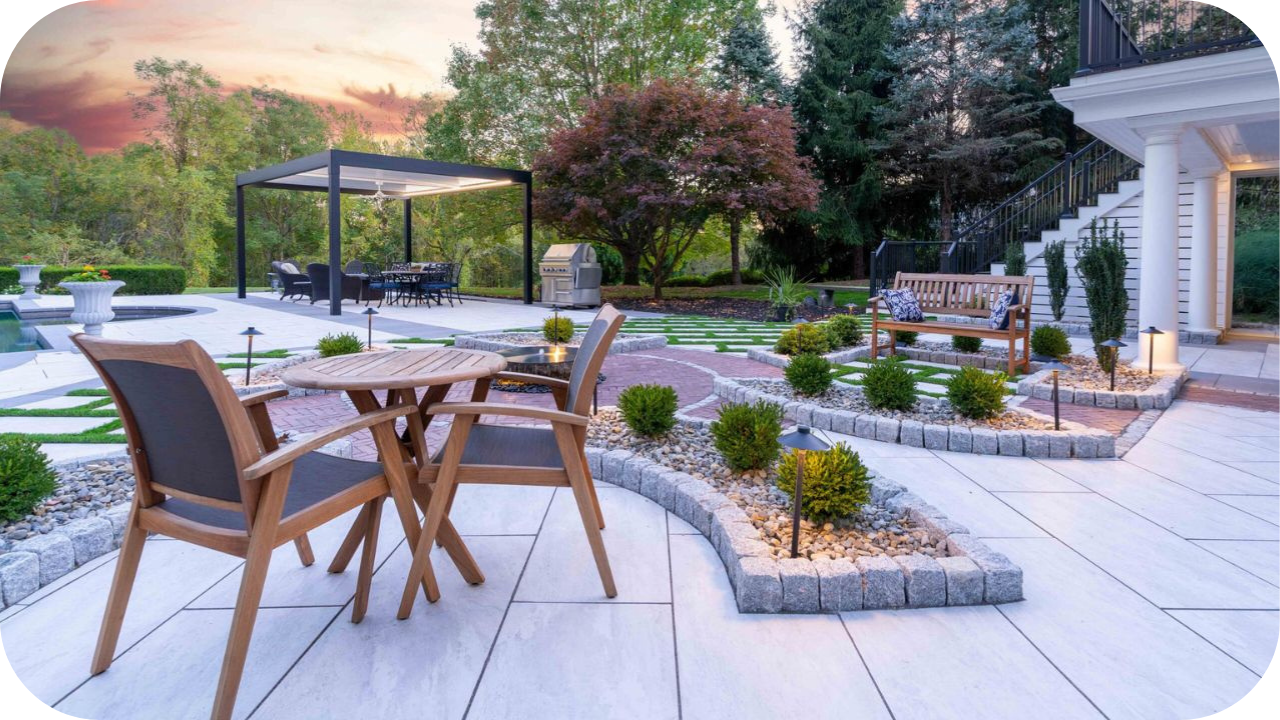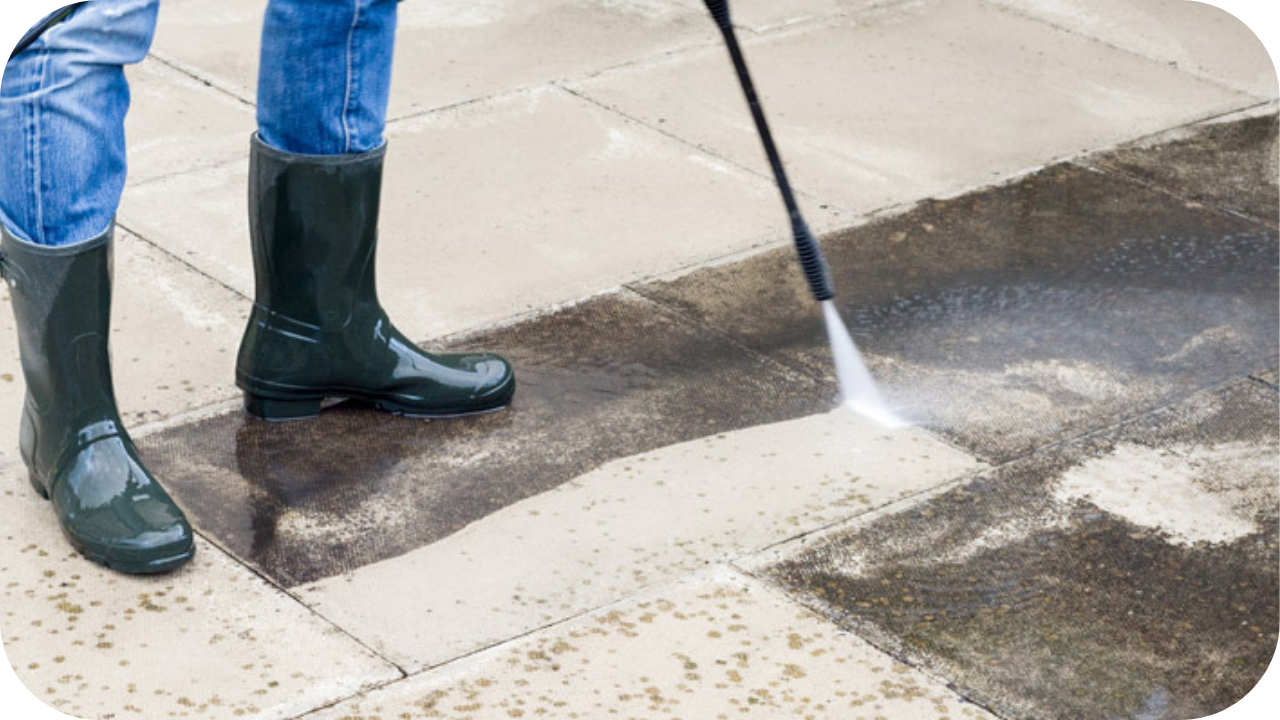
Choosing the right outdoor flooring for your patio is not just about appearance. It also affects durability, safety, and how well the space performs throughout the year.
Natural stone is a premium choice that offers long-term strength, low maintenance, and lasting beauty. Whether you’re designing a new alfresco area or upgrading an existing patio, the stone you select plays a major role in its final look and feel.
In this guide, you’ll learn which natural stones are best for patios and how to make the right choice.
Best Natural Stones for Patio Flooring
Choosing the right stone can completely transform your outdoor space. These natural stones offer the durability, beauty, and underfoot comfort your patio needs for everyday enjoyment.
1. Quartzite
Quartzite is one of the toughest outdoor stones, offering excellent heat resistance and natural slip protection. Andorra quartzite pavers, with a natural split finish, provide a textured and elegant look ideal for high-use alfresco settings.
2. Granite
Granite is incredibly dense and built to handle harsh outdoor conditions. Charcoal granite pavers with a flamed finish offer a sleek, modern surface that is both non-slip and perfect for driveways, patios, and walkways.
3. Bluestone
Bluestone is favoured for its strength and timeless appearance. Flamed bluestone pavers deliver a non-slip surface with rich blue-grey tones, while sawn bluestone offers a refined, uniform finish for modern or heritage-style patios.
4. Porphyry
Porphyry is naturally resistant to slipping and frost, making it perfect for unpredictable climates. Filetti porphyry adds a linear, structured feel, while porphyry crazy paving creates a more organic look with multi-toned colour variation.
5. Travertine
Travertine stays cool even in direct sun, making it ideal for hot weather areas. Silver travertine features layered grey tones and texture, while Ivory travertine adds warmth and softness to poolside or sunlit patios.
6. Limestone
Limestone suits both modern and traditional patios with its smooth texture and calming tones. Stamford limestone offers soft greys in a smooth finish, while Tuscan limestone with a tumbled finish gives rustic outdoor charm.
7. Marble
Marble adds sophistication to covered or low-traffic patios. Luna Grey marble has a honed, soft finish ideal for contemporary designs, while Provincial marble brings classic elegance with its creamy tones and subtle veining.
Most Suitable Stone Finishes for Patios
The finish you choose affects grip, texture, and overall appeal. These stone finishes balance function and style to suit a range of outdoor environments.
- Natural Split Finish: Provides a rough, uneven surface that enhances grip. Best for high-traffic or exposed patios where slip resistance and organic texture are both essential.
- Flamed Finish: Created by applying intense heat, this finish gives a slightly rough, slip-resistant surface. Commonly used on granite or bluestone in wet outdoor zones.
- Tumbled Finish: Delivers a soft, weathered look with rounded edges. Perfect for rustic patios or garden paths that aim to feel relaxed and naturally aged.
- Honed Finish: Smooth and matte with low reflectivity, this finish suits covered patios. It’s ideal for creating clean lines and a soft, contemporary surface.
- Brushed Finish: Features light surface texture and a slightly aged appearance. Excellent for casual patios where comfort, visual warmth, and understated grip are desired.
Recommended Colours and Patterns for Outdoor Settings
The right colour and layout can completely transform your patio. Here are outdoor-friendly choices that blend style with heat control, texture, and timeless visual appeal.
- Light Tones: Reflect heat and stay cooler underfoot, making them ideal for sunlit patios and poolside areas where surface temperature matters throughout the day.
- Dark Shades: Provide visual contrast and hide stains well. Best for shaded areas, covered patios, or sleek modern settings needing bold definition and reduced glare.
- Natural Colour Variation: Adds texture and depth to your outdoor space. Stones with tonal shifts or veining feel organic and help disguise minor marks or weathering.
- Ashlar or French Patterns: Offer a refined, structured look. These layouts use varied stone sizes to create visual interest while ensuring tight, balanced joins for durability.
- Crazy or Random Paving: Suits rustic or Mediterranean-style patios. Irregular stone pieces form a natural, relaxed surface full of charm, movement, and informal outdoor character.
Why Natural Stone Is Ideal for Patio Flooring
Natural stone is one of the most dependable materials for outdoor living. Here’s why it stands out as the ideal surface for patios of all styles.
1. Long-Lasting and Weatherproof
Natural stone easily handles harsh sun, heavy rain, and strong wind without fading, cracking, or breaking down. It maintains structural integrity and appearance with very little long-term maintenance required.
2. Safe Underfoot with Natural Grip
The textured surfaces of stone provide strong traction, even when wet. This makes it ideal for pool surrounds, pathways, or open patios where stable footing is a top priority.
3. Enhances Outdoor Style and Ambience
From clean contemporary to rustic charm, stone matches every design style. Its earthy textures, tonal variations, and natural movement elevate the character of outdoor living spaces effortlessly.
4. Adapts to Seasonal Conditions
Stone naturally stays cool in hot weather and gently holds warmth when it’s cooler. This balanced surface comfort helps extend patio use throughout the year without added treatments.
5. Low Maintenance and Easy to Clean
Natural stone requires very little upkeep. Occasional sweeping and the use of mild cleaners are usually enough to keep it looking fresh and performing well over time.
Key Factors to Consider When Choosing Outdoor Stone
Not all stone suits every space. Before selecting outdoor flooring, consider these essential factors to ensure the stone performs well and complements your patio for years.
1. Climate and Weather Exposure
Choose stone based on your location’s weather. Dense options like granite or quartzite handle rain and heat well, while softer stones need sealing in coastal or freeze-prone environments for better durability.
2. Foot Traffic and Intended Use
Heavily used patios need stronger stones. Granite or quartzite works well in dining or entertainment zones, while lighter-use areas like garden nooks may suit travertine or marble with proper care.
3. Surface Grip and Underfoot Safety
Patios near pools or lawns require textured stones that offer natural grip. Finishes like flamed, split, or brushed are ideal for ensuring firm footing, especially in areas prone to moisture.
4. Stone Thickness and Sub-Base Compatibility
Thicker pavers are needed for load-bearing areas like driveways or large courtyards. Always match stone thickness with a well-prepared sub-base to avoid shifting, sinking, or cracking over time.
5. Style Compatibility with Home Exterior
The stone you choose should harmonise with your home’s materials and palette. For example, creamy limestone suits coastal homes, while deep grey granite complements industrial or modern designs.
6. Budget and Installation Method
Different stones vary in price, and so do their installation methods. Dry-lay options can save on labour, while premium stones and mortar-set installs require more upfront investment but offer superior longevity.
How to Maintain Outdoor Stone Flooring for Long-Lasting Performance
Proper care keeps your stone flooring looking great and performing well for years. These simple maintenance steps help protect your patio from damage, weathering, and unnecessary wear.
1. Sweep Regularly to Remove Debris
Loose dirt, leaves, and grit can cause staining and surface wear over time. A quick sweep once or twice a week helps maintain a clean, safe, and visually appealing surface.
2. Use pH-Neutral Cleaners When Washing
Avoid acidic or harsh chemical cleaners, as they can damage or discolour natural stone. Choose pH-neutral products to gently clean your patio without affecting the stone’s texture or finish.
3. Reseal Porous Stones Periodically
Stones like limestone and travertine absorb moisture and should be resealed every few years. Sealing protects against staining, surface erosion, and weather exposure while keeping the colour and finish intact.
4. Address Cracks and Movement Early
Inspect your patio regularly for chips, loose pavers, or shifting sections. Fixing small issues early prevents them from spreading and helps maintain a safe, durable outdoor surface over time.
5. Avoid Dragging Furniture Across the Surface
Dragging heavy furniture can scratch or chip your stone flooring. Use protective pads under legs and lift furniture when rearranging to keep the stone’s finish smooth and intact.
Conclusion
Choosing the right natural stone for your patio ensures long-lasting beauty, comfort, and performance outdoors.
From dense quartzite to elegant marble, each option has strengths that suit different spaces and styles. By considering climate, use, and care, you’ll make a confident, lasting choice.
For expert guidance and access to premium outdoor stone solutions, contact the team at Splendour in Stone to bring your patio vision to life.
More To Explore

Natural Stone Materials: Types, Benefits, and Choosing the Right Stone for Your Project
Natural stone is widely used in Australian homes because it offers lasting beauty, strength, and natural character in both indoor and outdoor spaces. Its variation

How to Maintain Limestone Pavers for Long Term Surface Quality
Limestone is a favourite choice for Australian outdoor spaces because its soft texture and natural warmth bring a relaxed, timeless feel to patios, pathways, and


